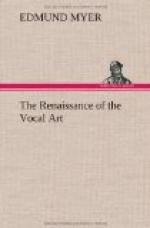ARTICLE TWO.
THE FIFTH PRINCIPLE OF ARTISTIC SINGING.
The fifth principle of artistic singing is
Automatic Articulation.
Theory.—Articulation must be spontaneous, the result of thought, and of the effect desired, never of direct or local effort. The thought before the action, never the action before the thought.
Devices.—The development of the consonantal sounds through the study of the three points or places of articulation, and the application by the use of words, sentences, and sentiment, vitalized and intensified.
In our course of study or in the formula here given, it will be evident to the reader that we lay much stress upon the principle of vitality or vitalized energy. In the second part of this work we have considered the principles and the devices that develop physical and mental vitality. In the article which directly precedes this, special emphasis is placed upon emotional vitality. Vitality or vitalized energy, it will be found, holds good also in this, the fifth fundamental principle of artistic voice production.
Articulation, to be artistic, must be automatic and spontaneous; must be the result of thought and effect desired, and never of direct or local effort. This being true, we must recognize the importance of freedom of form and action, of the removal of all restraint, in fact, the importance of all true conditions of tone. This brings us back again to our original position, as do all the fundamental principles of singing; namely,—the importance of the free, flexible movements of our system, upon which freedom of form and action, in fact, all true conditions of tone, depend.
Language, spoken language, has been considered by many a vocal weakness. Scientists have contended that the consonantal sounds weaken the resonance and power of the vowels. We have found the opposite to be true. We have found that the consonantal sounds in many ways are a wonderful help in developing the voice. This proves that which some one has so well said, “The demonstrations of yesterday are the falsehoods of to-day.”
A free, flexible articulation of the consonantal sounds helps to place the voice, and gives it life and freedom. Articulation, under right conditions, will not interfere with the legato flow of voice. It is not necessary, as many suppose, to sacrifice distinct utterance in song for the sake of the legato flow of voice, the most desired mode of singing. On the other hand, the free legato flow of the vowels need not interfere at all with distinct articulation. The voice is composed of two separate and distinct instruments, the organ which produces sounds or vowels, and the articulating organ which produces consonants. These two instruments, when properly trained, strengthen, complement, and support each other, and together they mold vowels and consonants into speech.




